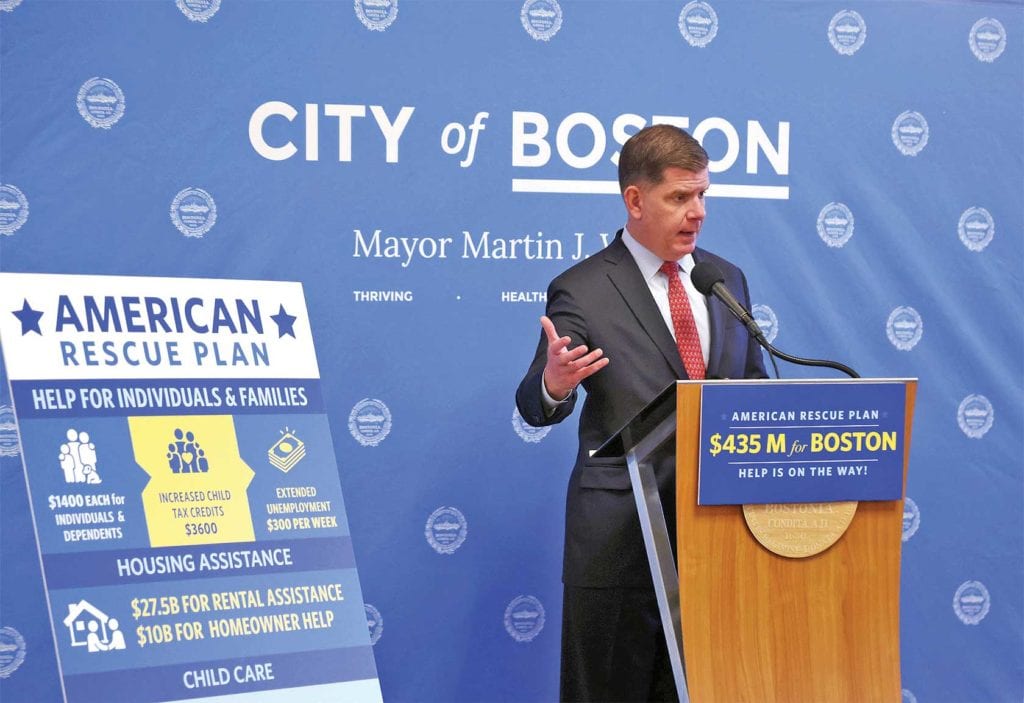
At a press conference Monday, Mayor Martin Walsh and Congressman Stephen Lynch discussed how President Biden’s $1.9 trillion stimulus package will help Boston recover from the pandemic. The recovery, Walsh says, is just beginning, but the damage done by the pandemic is “long-lasting.”
As of Sunday March 14, there were 87 new COVID-19 cases in the city of Boston and four new deaths. The seven-day average for positive tests was 165 and the average daily positive rate was 3.6%.
As of March 10, 23.7% of Boston residents aged 16 or older have gotten at least one dose of the vaccine, and 13.3% are fully vaccinated.
The American Rescue Plan
The $1,400 federal stimulus checks promised in the stimulus plan have already begun to go out to families with incomes under $150,000; child tax credits were expanded to $3,600 in monthly installments; and the $300 weekly boost to unemployment benefits has been extended through the spring and summer.
“While most of the money in the American Rescue Plan is targeted by population, we also took a very hard look at areas that had been more heavily impacted,” Lynch said, “either because of high minority populations or poor neighborhoods that did not have the existing infrastructure, from a health care standpoint.”
In the bill, $7.6 billion is allocated for community health centers; a restaurant stabilization fund has $28.6 billion; and $350 billion overall is allotted to states, cities, towns and tribal governments. For transportation, $80 billion will be allocated to airports, and about a billion for transportation systems, with a “targeted increase for the MBTA as well,” Lynch said.
Lynch said he prefers that the MBTA use the money to prevent layoffs due to planned service cuts that went into effect this week.
“We are in total opposition to the reduction in services, to the laying off of employees,” he said, speaking for the state’s full congressional delegation.
Education is addressed in the rescue plan as well. There is $130 billion for schools overall, with segments dedicated to higher education and private and parochial schools, who may need updates to ventilation systems in order to mitigate the spread of COVID-19.
Vaccine rollout
Lynch gave an update on the vaccine rollout from a state and federal perspective. He said the Massachusetts delegation was critical of the state government’s vaccine registration system and hopes for a better process going forward.
“We were hearing significant complaints about how the delivery aspect of the vaccine process was going forward, and that’s where we asked for a registration system, where people weren’t going out to sites and then being turned away,” he said.
He announced an increase in the amount of vaccine doses available, which is good news for Massachusetts’ rollout. About a month ago, there were about 108,000 to 130,000 vaccines for Massachusetts per week, but since Biden took control of the rollout, Lynch says we’re seeing closer to 160,000 a week. It’s expected that by the end of March, the federal government will have around 20 million more doses in the pipeline.
Walsh noted that in Boston, the city is working with the Boston Teachers Union to open a vaccination clinic at BTU’s building in Dorchester, now that K-12 educators are eligible to receive the vaccine.
Outdoor dining
Walsh announced Friday that outdoor dining will return to Boston March 22, an earlier date than previously announced, and on Monday he followed up about the process. The North End will see a later start of April 1, but otherwise, the city is proactively reaching out to businesses to get started.
“The city has made hundreds of personalized calls to businesses that applied for outdoor dining last year. We are putting a big emphasis on outreach to businesses owned by people of color all across the city,” Walsh said.
The city’s Office of Economic Development will work with the Boston Black Hospitality Coalition to give technical support to businesses who need it.






